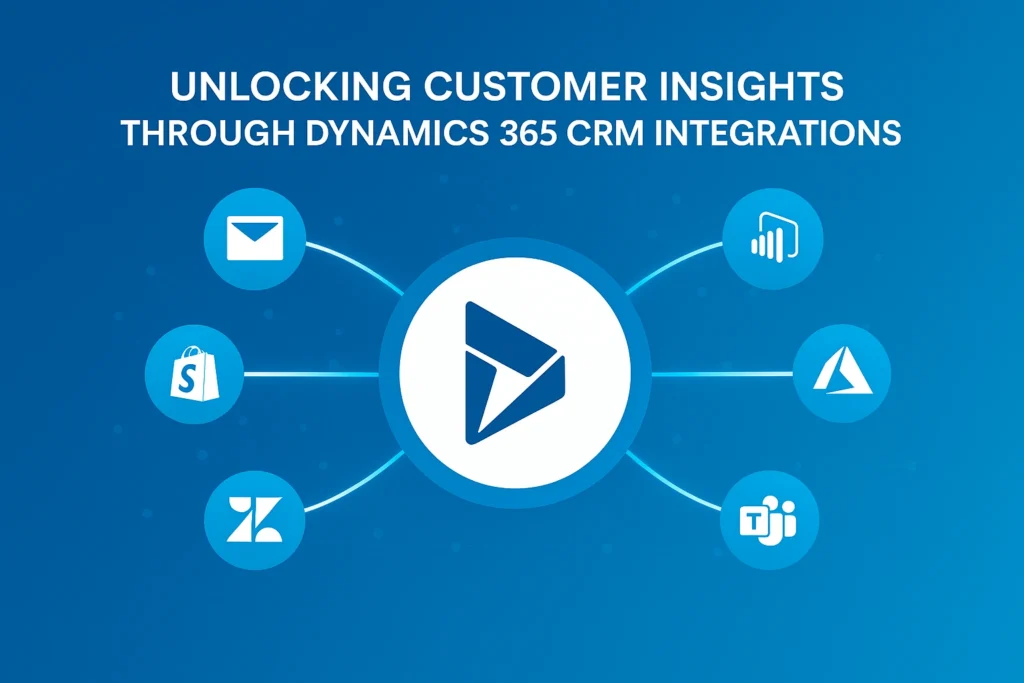Unlocking Customer Insights: Dynamics 365 CRM Integrations
In the modern digital economy, the customer anticipates the business to be aware of them, not their names, but preferences, previous purchases, and even their future needs. It is not only necessary to store customer data and hope that this will meet the expectations but also it is appropriate to identify the interrelation of the dots between various touchpoints.
That is where Dynamics 365 CRM integrations come in. When a business combines CRM with other tools and platforms, new horizons are opened to understand customers better, which can be used to make more intelligent decisions, create more personalized customer experiences and build stronger relationships.
Let’s break it down.
1. Creating a 360° Customer View
The customer information is traditionally stored in silos. The emails are stored in one system, the purchases in another, and the support tickets somewhere. All of this comes together with Dynamics 365 CRM integrations.
- Email Integration (Outlook, Gmail): All the conversations are monitored.
- Ecommerce Integration (Shopify, WooCommerce): Automatic purchase synchronization.
- Support Platforms (Zendesk, Teams): The history of services is linked.
The outcome: Sales, service and marketing teams have a glimpse view of the whole customer journey.
2.Personalizing Customer Experiences
When customers feel that they understood, then chances are that they will purchase. Integrations give more power to personalization:
- Automation Marketing Systems: Issue targeted offers based on previous purchases.
- Social Media Integrations: Monitor the conversations with customers on such platforms as LinkedIn or Twitter
- AI-Powered Insights: Future needs prediction and product recommendations.
Example: When a customer purchases baby products, CRM will be able to launch an automated campaign where related goods will be offered at a discount price.
3. Smarter Sales & Marketing Decisions
Connections to both Power BI and Azure Synapse help to turn raw customer data into a visual dashboard.
- Determine high spending customers.
- Local trends in the sale of products.
- Forecast future demand.
The decision-makers now do not operate on guesswork but use insights that are backed by data.
4. Faster & Proactive Customer Support
In the cases where CRM is connected with support systems:
- Agents get the entire history of the customer in real time.
- Issues are resolved faster.
- The proactive support can be achieved (addressing the problems in advance, before they occur).
Example: IoT with CRM: A company is warned when a device of a customer is breaking down and the support calls it even before this customer will complain.
5. Breaking Down Data Silos for Better Collaboration
Lack of integration will result in the marketing, sales and service teams operating under various versions of customer data. With CRM integrations:
- There is one source of truth, on which everyone works.
- Teamwork enhances interdepartmental cooperation.
- Customers receive homogenous experiences regardless of whom they deal with.
Final Thoughts
Dynamics 365 CRM alone is robust, but when combined with the appropriate platforms, it can be considered a customer insight powerhouse.
Transforming data into insights and interactions into enduring relationships, CRM integrations move the concept of building a 360deg view of customers, as well as promoting the marketing process and making it smarter and forward thinking.
In the modern world, the most successful businesses are not those that have the most data, but those that have learned how to relate, interpret, and respond to it.









